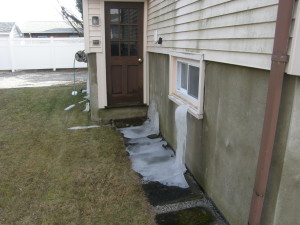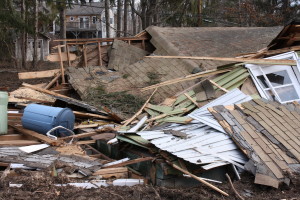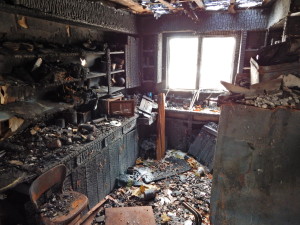
Public adjusters and insurance carriers know that winter is the season for insurance claims.
Fortunately, the Blizzard of 2015 wasn’t the worst for most of New England. The snow was light and fluffy and the windy snowstorm tracked out to the Atlantic Ocean more a bit more quickly than expected. Even though the winds topped 40 miles per hour, Winter Storm Juno just didn’t deliver the kind of snow that clings and brings down power lines causing widespread outages. However, the big storm at the end of January made one thing perfectly clear this year: despite seasonably mild temperatures the past few weeks, winter has definitely arrived in the northeast U.S.
One out of every five property insurance claims filed from 2008 to 2012 was the result of water damage or freezing caused by extreme winter weather conditions.
Source: Insurance Information Institute
If you are worried about the potential cost of rebuilding after having suffered winter storm damage, you have good reasoning and statistics to back your concerns. “Losses from snow, ice, freezing and related causes totaled $2.3 billion last year,” says the Insurance Information Institute ,”the last two years have been well above what the insurance industry has traditionally seen from this type of severe weather.” Unfortunately, most policyholders have no idea that a public adjuster can help to level the playing field and be a great resource for the homeowner unfamiliar with the insurance claims process if you decide to file an insurance claim.

In 2011, wind and hail damage accounted for 46% of all homeowner and renter insurance claims. In 2012, wind and hail damage claims rose to 47.2%
Source: Insurance Information Institute
If you find yourself knee-deep in a mess that scares you, consider consulting a public adjuster who can advise you on the potentially costly issues that you now face. Unfortunately, most insurance carriers bank on the fact that most policyholders never read their policies. If you have never read the fine print in your policy and you have never filed a claim, you, like most policyholders will be at the mercy of the carrier for explanations of coverage and other questions about the policy. That’s like putting a kid with a sweet-tooth in charge of your candy store – he’s probably going to do a good job because he want to come back tomorrow, but, next week you’re bound to figure out that you’re missing some of your favorite treats.
And, let’s not make any mistakes about this: no matter how nice your agent has been all those years because you’ve been paying your premiums, your agent may very well be totally out of the picture when it comes time for you to file a claim, and, most agents will not ever mention that utilizing a public adjuster is an option should you need to file an insurance claim.
From 2008 to 2012, the average property damage insurance claim cost $8255
Source: Insurance Information Institute
Here are some guidelines from experienced public adjusters to help you to quickly make the right decision about handling your insurance loss if you are a winter weather damage victim and you must file a claim because of a collapsed or crushed roof, frozen pipe flood or ice dam damage:
Tips to Stay on Top of the Damage
1. A good public adjuster is always armed with a camera and you should be too. If you see the damage, shoot it! Grab you cell phone and take pictures! Nothing works better than date and time stamped pictures or video to convince an insurance carrier that you are a bonafide victim. People try to fake this stuff all the time, but, you can quickly separate yourself from the frauds that carriers are always trying to weed out by simply having evidence that your mess is genuine, not your fault and covered by your policy.
2. Do not hesitate to take action to prevent further damage from happening to your property. In fact, your policy most likely requires you to do so.
3. CNN Money advises policyholders and renters very succinctly,”Your idea of fair compensation may not match that of your insurer. Your insurer’s job is to restore you financially. Your job (and you can get a public adjuster to help you do this) is to prove your losses so you get what you need. At claims time, your insurer isn’t necessarily your friend.“
Insurance claims expense drives up the cost of premiums: from 2004 to 2012, premiums for homeowners insurance rose more than 40%
Source: Insurance Information Institute
4. Sometimes policyholders are afraid to file a claim and hire a public adjuster because they fear that their premiums will go up. If you are one these people, ask yourself this question: “Did I ever see my premiums increase during all those years I never filed a claim?” After you answer this honestly, proceed to the next tip.
5. Here’s one that often make public adjusters cringe: If you report your damage to your carrier and your insurance company advises that you use a specific cleaning and restoration company, realize that you do NOT have to use that particular company; you are free to pick your own. So many policyholders mistakenly assume that they must go with the company that their carrier recommends. However, making this decision on your own (or with the help of a public adjuster) is one of the quickest ways to separate yourself from the herd of policyholders who get duped into sub-standard service by going with the cleanup crew sent in by an insurance carrier whose only goal is to save on the bottom line. Sometimes carriers recommend great restoration companies, however, I’ve heard from several homeowners who wish they hadn’t gone with the restoration company their carrier first mentioned following a disaster. Unfortunately, some carriers send in the cheapest restoration company they can find, and the homeowner suffers in the end because the best work just won’t get done by one of these outfits. If you know of a top-notch cleaning and restoration service, this is the time to call them. Perhaps you have a neighbor or family member who recently had a disaster – what company did they use that provided excellent results? The time to make the right decision is before you allow the wrong company into your home. The first step in fixing your mess is picking the right company at the start. A good public adjuster can be an excellent source for weeding out the “bad guys” in your local area.
Winter storms caused an estimated $2.3 billion in insurance claim losses in 2014, up from $1.9 billion in 2013
Source: Insurance Information Institute
6. Understand that when your carrier says to you, “You’ll be hearing from YOUR adjuster”, this person, no matter how nice he or she is, represents your carrier’s interests, not yours. Any adjuster that you did not hire yourself is not really there to protect your interests. Very simply, insurance carriers are represented by either company or independent adjusters, policyholders’ interests are represented by public adjusters.
7. If you spend money for supplies or equipment to do any of the cleanup, keep receipts. Realize that if you decide to do the cleanup yourself, you will most likely only be reimbursed for the cash that you can prove you spent. Your sweat, sleepless nights and labor will undoubtedly be appreciated, but, will most likely not be reimbursed by your insurance carrier. Once you have established that your loss is covered, it may be more cost effective in terms of your sweat equity to hire reputable restoration professionals who will assess and cleanup your damage and do the repair work better than you possibly could.
Public Adjusters remind homeowners of some basic preventive measures from the Insurance Information Institute to minimize damage and winter weather-related insurance claims:
8. Watch for ice dams near gutter downspouts. Keep gutters free of leaves and debris so melting snow and ice can flow freely. Ice dams can cause water to build up and seep into your house.

9. If your garage is attached to your house, keep the garage doors closed. The door leading to the house is probably not as well-insulated as an exterior door.
10. If you use fireplaces, wood stoves and electric heaters, watch them closely and make sure they are working properly.
Again, if you have any questions regarding fire, winter weather or blizzard damage to your home just remember that a good public adjuster can provide valuable information so that you and your family get the full value of the policy that protects your home and property.